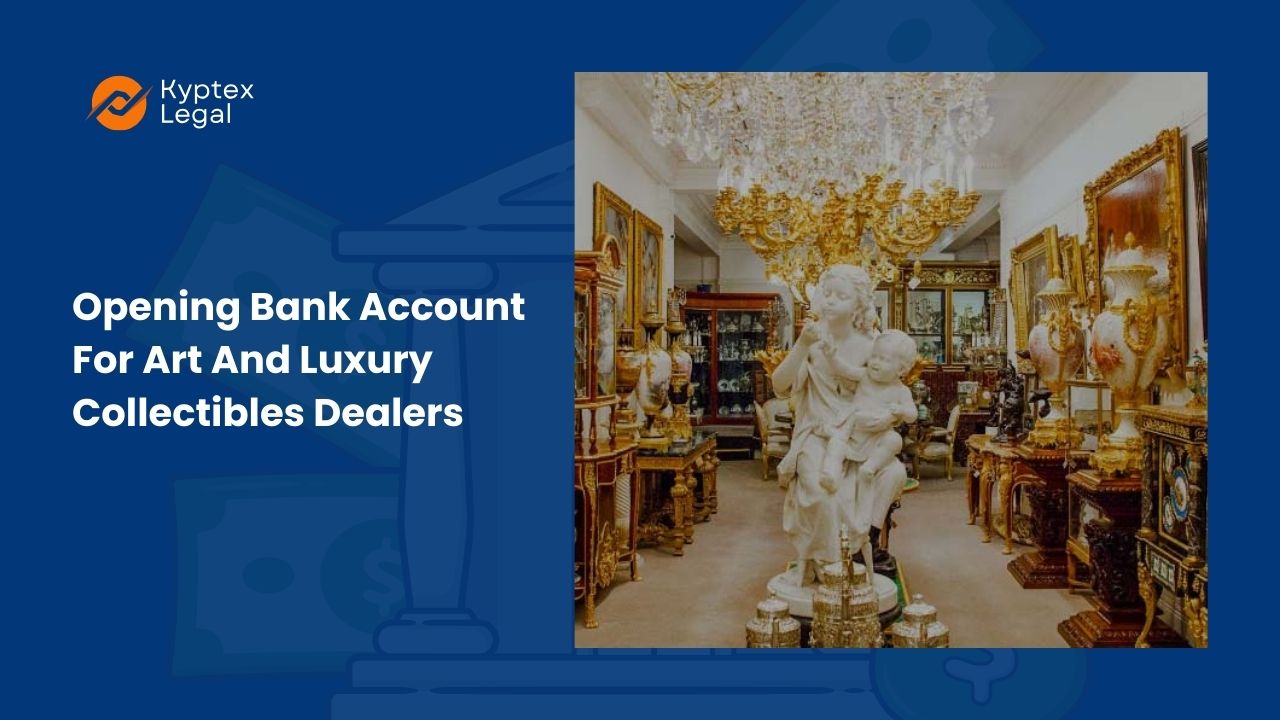
The art and prestige collectibles market necessitates sophisticated financial solutions. Dealers who handle high-value artworks, uncommon collectibles, and luxury items necessitate specialized bank accounts that are tailored to their specific requirements. It is imperative to select the appropriate banking solution, regardless of whether you are responsible for managing international transactions, interacting with clients on a global scale, or protecting your wealth.
Why Specialized Bank Accounts Are Crucial For Art Dealers?
Routine finance transactions are not the only aspect of managing art and luxury collectibles. Specialized bank accounts are indispensable for the following reasons:
- High-Value Transactions: In order to facilitate substantial transfers and payments from high-net-worth clients, dealers require secure systems.
- Global Operations: Cross-border transactions necessitate minimal transaction fees and multi-currency support.
- Anti-Money Laundering Compliance (AML): Banks that provide customized services guarantee that transactions comply with international regulations and legal frameworks.
- Asset Management: Certain accounts offer services to oversee investments, wealth, and insurance for valuable art and collectibles.
A bank account that is appropriately selected simplifies operations, guarantees financial security, and offers the necessary tools to effectively manage the unique requirements of a business.
Key Features to Look for in a Bank Account For Art And Luxury Collectibles
1. Multi-Currency Capabilities
Accounts that enable dealers to hold, transmit, and receive funds in multiple currencies without incurring exorbitant conversion fees are advantageous for those who operate internationally.
2. IBANs of Countries Recognized
Dealers typically collaborate with wealthy clients; consequently, trust is paramount. Having a dedicated IBAN account from jurisdictions such as the United States, the United Kingdom, the Netherlands, or Luxembourg can provide an additional layer of trust.
3. High-Transaction Limits
Select accounts with generous transaction limits to facilitate substantial payments, such as the sale of luxury items or art pieces.
4. Compliance with Anti-Money Laundering (AML) and Know Your Customer (KYC)
– Your transactions are protected by banks that have comprehensive AML and KYC policies, which ensure that they comply with regulatory standards and safeguard your reputation.
5. Access to Insurance Solutions
Certain institutions provide specialized services, such as insurance for high-value items.
6. Customer Support with a Global Reach
Search for accounts that offer customer service that is available across time zones and have dedicated relationship managers.
Types of Bank Accounts Suitable for Art and Collectibles Dealers
1. Accounts in Private Banking
- Private banking services provide a high level of privacy and customized financial solutions, which are advantageous to high-net-worth individuals and merchants.
2. Business Accounts on an International Scale
- International business accounts simplify payments, payroll, and client transactions for enterprises that operate in multiple countries.
- They provide dedicated dealers, spot transactions, and FX forwards, as well as multi-currency management tools and low-cost international remittances.
3. Financial Platforms That Emphasize Art
- Certain fintech companies and banks specialize in art financing, offering escrow services, loans, and credit lines for art transactions.
4. Banks that offer traditional services but offer lavish amenities
- Premium banking options are available to luxury markets, such as art and collectibles, through institutions such as HSBC, UBS, and JP Morgan.
- These institutions frequently offer advisory services and customized insurance solutions for collectibles.
Easy Steps Guide to Opening a Bank Account
1. Investigate the Most Effective Alternatives
- Evaluate banks according to your requirements, including international remittances, advisory services, and luxury-specific offerings.
- Evaluate any potential partnerships with art institutions or auction houses.
If you are interested in receiving an up-to-date list of digital institutions that have experience in the art and luxury industries, please complete our contact form with your information. An email will be sent to you with the roster.
2. Prepare the Required Documents
- Documents that are typically required include:
- Government-issued identification or passport
- Address verification
- Documents pertaining to business registration (if applicable)
- Records of ownership for luxury items (for insurance-linked accounts)
3. Submit Your Application
- While numerous banks permit online applications, private or premium accounts may necessitate an in-person encounter.
4. Finalize the KYC and AML procedures.
- Prepare for the bank’s due diligence procedure, which will verify your identity and ensure that you are in compliance with anti-money laundering regulations.
5. Enable Your Cards and Account
- Activate your account and request any requisite tangible or virtual cards for transactions once it has been approved.
6. Establish linkages between payment and auction platforms
- Simplify transactions by integrating your account with payment services, invoicing tools, and auction platforms.
Important Notes For the Art And Collectibles Industry
- Tax Regulations: Guarantee adherence to both domestic and international tax regulations. Consult with a tax expert who is well-versed in the field of art and collectibles.
- Insurance Coverage: Opt for a bank that provides comprehensive insurance solutions to safeguard your valuable possessions.
- Currency fluctuations: When conducting international transactions, it is important to consider exchange rates. Utilize FX risk management instruments whenever feasible.
- Legal Compliance: To ensure the legitimacy of your business, it is essential to remain informed about AML and KYC regulations.
Conclusion
It is imperative to establish a bank account that is specifically designed for the art and luxury collectibles market in order to ensure secure and efficient financial administration. Selecting the appropriate account provides financial security and operational efficiency, regardless of whether you are safeguarding high-value assets, planning investments, or managing international payments.